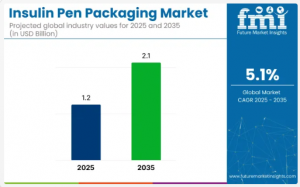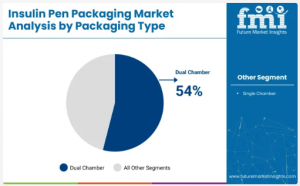Smart, Safe, and Scalable: Insulin Pen Packaging Evolves with Patient-Centric Design and Global Healthcare Shifts
Driven by rising diabetes cases, tech-enabled care, and regional innovation, insulin pen packaging adapts to modern health and design demands.
NEWARK, DE, UNITED STATES, August 6, 2025 /EINPresswire.com/ -- The global insulin pen packaging market is on a steady growth path, with its value projected to increase from USD 1.2 billion in 2025 to USD 2.1 billion by 2035. This growth, at a Compound Annual Growth Rate (CAGR) of 5.1%, is primarily fueled by the increasing worldwide prevalence of diabetes and the growing patient demand for convenient, discreet, and easy-to-use insulin delivery systems.
As diabetes management increasingly shifts toward home-based care, the packaging of insulin pens is evolving to provide enhanced functionality, protection, and patient safety. A small but highly specialized segment within the broader pharmaceutical industry, this market is becoming a critical area for innovation, focusing on usability and security.
Dual-Chamber Packaging and Plastic Dominate Segments
The market's expansion is underpinned by key trends in material and packaging design:
- Dual-Chamber Packaging Leads: Dual-chamber insulin pens are expected to hold a dominant 54% share of the packaging segment in 2025. This format is a preferred option for patients needing combination therapies, as it allows for precise dosing and the integration of multiple medications in a single device, directly addressing the need for user-centric and safe delivery systems.
- Diabetes Care Drives End-Use: With a commanding 71% share, the diabetes care segment remains the leading end-use application. This growth is a direct consequence of the increasing global diabetes population and the trend toward self-administration, which necessitates packaging solutions that are not only secure but also simple to use. Major pharmaceutical companies like Novo Nordisk and Eli Lilly are continuously innovating in this space to meet patient needs.
- Plastic is the Preferred Material: Plastic is set to account for a 60% share of the material market in 2025. Its versatility, lightweight nature, and cost-effectiveness make it an ideal choice for manufacturers. Advancements in plastic technology, including improved barrier properties and tamper-proof designs, further enhance its appeal and functionality for insulin pen production.
Navigating Growth Drivers and Key Challenges
The market is being propelled forward by several key dynamics. Rising diabetes rates are driving innovation in smart insulin administration, with a focus on packaging that supports real-time data capture and tamper-evidence to enhance patient adherence and improve therapeutic outcomes. The industry is responding by developing smart pen ecosystems that integrate adherence analytics and cloud-linked dosage logs.
However, the market also faces significant challenges, particularly stringent regulatory hurdles and affordability constraints. Manufacturers must meet strict integrity criteria like ISO 11607, which can extend validation cycles and increase costs. Price caps imposed by payors further squeeze profit margins, making it difficult for smaller companies to invest in cutting-edge sensor technologies.
Regional Growth Highlights
Growth is not uniform globally, with distinct trends emerging in different regions:
- Fastest Growth in Asia-Pacific: Emerging economies are leading the charge. China is projected to grow at a 6.8% CAGR and India at a 6.5% CAGR, outperforming the global average. This is driven by a high prevalence of diabetes and increased government investment in healthcare.
- Stable Growth in Developed Economies: Developed markets like the United States (5% CAGR) and the United Kingdom (4.8% CAGR) are experiencing stable growth, shaped by an established healthcare infrastructure and a focus on user-friendly, ergonomically designed, and eco-conscious packaging formats. Japan is also showing strong growth at 6.1% CAGR, driven by its aging population and demand for high-purity biologic packaging.
Request Insulin Pen Packaging Market Draft Report: https://www.futuremarketinsights.com/reports/sample/rep-gb-22384
For more on their methodology and market coverage, visit! https://www.futuremarketinsights.com/about-us
Competitive Landscape and Industry Developments
The industry landscape is semi-fragmented, with major pharmaceutical companies like Novo Nordisk, Eli Lilly, and Sanofi as key drivers of innovation. Specialized packaging equipment manufacturers such as Syntegon, AAE, and Bausch + Ströbel provide the high-speed, automated machinery needed for production.
Recent industry news underscores the market's dynamic nature. In a move highlighting strategic adaptability, diabetes device manufacturer Embecta announced it is exploring a potential sale. Meanwhile, SCHOTT Pharma's launch of a new ready-to-use glass cartridge for Ypsomed's UnoPen® platform demonstrates the ongoing collaboration to advance primary packaging. The approval for Cipla to distribute an inhalable insulin in India also signals a potential shift toward non-injectable alternatives, which could influence future packaging innovation.
Related Reports:
Insulin Pumps Market: https://www.futuremarketinsights.com/reports/insulin-pumps-market
Insulin Biosimilar Market: https://www.futuremarketinsights.com/reports/insulin-biosimilars-market
Insulin Management System Market: https://www.futuremarketinsights.com/reports/insulin-management-system-market
Editor’s Note:
This release is based exclusively on verified and factual market content derived from industry analysis by Future Market Insights. No AI-generated statistics or speculative data have been introduced. This press release highlights significant shifts in the Insulin Pen Packaging Market, which is experiencing a pivotal change driven by consumer demand for healthier, more transparent products.
Rahul Singh
Future Market Insights Inc.
+18455795705 ext.
email us here
Visit us on social media:
Other
Legal Disclaimer:
EIN Presswire provides this news content "as is" without warranty of any kind. We do not accept any responsibility or liability for the accuracy, content, images, videos, licenses, completeness, legality, or reliability of the information contained in this article. If you have any complaints or copyright issues related to this article, kindly contact the author above.
Accounts Receivable Outsourcing Services Support Financial Clarity Across U.S. Healthcare
American Receivable Celebrates 46 Years of Success and Steady Leadership
Global Ready-Mix Concrete Market Is Expected to Reach $704.2 Billion by 2030: Says AMR
Więcej ważnych informacji
 Jedynka Newserii
Jedynka Newserii

 Jedynka Newserii
Jedynka Newserii

Polityka

D. Joński: Nie wiemy, co zrobi Rosja za dwa–trzy lata. Według duńskiego wywiadu może zaatakować kraje nadbałtyckie i musimy być na to gotowi
Zdecydowana większość krajów unijnych wskazuje na potrzebę wzmocnienia zdolności obronnych Europy w obliczu coraz bardziej złożonego geopolitycznego tła. Wywiady zachodnich państw wskazują, że Rosja może rozpocząć konfrontację z NATO jeszcze przed 2030 rokiem. Biała księga w sprawie obronności europejskiej „Gotowość 2030” zakłada m.in. ochronę granic lądowych, powietrznych i morskich UE, a sztandarowym projektem ma być Tarcza Wschód. – W budzeniu Europy duże zasługi ma polska prezydencja – ocenia europoseł Dariusz Joński.
Transport
Duże magazyny energii przyspieszą rozwój transportu niskoemisyjnego w Europie. Przyszłością może być wodór służący jako paliwo i nośnik energii

Zmiany w europejskim transporcie przyspieszają. Trendem jest elektromobilność, zwłaszcza w ramach logistyki „ostatniej mili”. Jednocześnie jednak udział samochodów w pełni elektrycznych w polskich firmach spadł z 18 do 12 proc., co wpisuje się w szerszy europejski trend spowolnienia elektromobilności. Główne bariery to ograniczona liczba publicznych stacji ładowania, wysoka cena pojazdów i brak dostępu do odpowiedniej infrastruktury. – Potrzebne są odpowiednio duże magazyny taniej energii. Przyszłością przede wszystkim jest wodór – ocenia Andrzej Gemra z Renault Group.
Infrastruktura
W Polsce w obiektach zabytkowych wciąż brakuje nowoczesnych rozwiązań przeciwpożarowych. Potrzebna jest większa elastyczność w stosowaniu przepisów

Pogodzenie interesów konserwatorów, projektantów, inwestorów, rzeczoznawców i służby ochrony pożarowej stanowi jedno z największych wyzwań w zakresie ochrony przeciwpożarowej obiektów konserwatorskich. Pożary zabytków takich jak m.in. katedra Notre-Dame w Paryżu przyczyniają się do wprowadzania nowatorskich rozwiązań technicznych w zakresie ochrony przeciwpożarowej. W Polsce obowiązuje już konieczność instalacji systemów detekcji. Inwestorzy często jednak rezygnują z realizacji projektów dotyczących obiektów zabytkowych z uwagi na zmieniające się i coraz bardziej restrykcyjne przepisy czy też względy ekonomiczne.
Partner serwisu
Szkolenia

Akademia Newserii
Akademia Newserii to projekt, w ramach którego najlepsi polscy dziennikarze biznesowi, giełdowi oraz lifestylowi, a także szkoleniowcy z wieloletnim doświadczeniem dzielą się swoją wiedzą nt. pracy z mediami.





![Nestlé w Polsce podsumowuje wpływ na krajową gospodarkę. Firma wygenerowała 0,6 proc. polskiego PKB [DEPESZA]](https://www.newseria.pl/files/1097841585/fabryka-nesquik_1,w_85,r_png,_small.png)




.gif)

 |
| |
| |
|